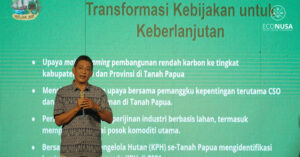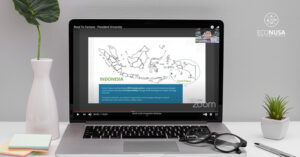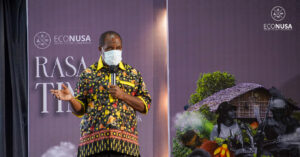
Climate change impacted by global warming imposes serious issues for all parties’ consideration. The central and regional governments, academic society, media and community can work hand in hand to cope with climate change impact. For the reason, it is necessary to create shared knowledge to materialize collaboration among elements. This is the main goal of a constructive discussion to enhance knowledge on climate change through FGDs entitling “Building Joint Perception on Climate Change Adaptation and Mitigation in A Bid to Strengthen Low Carbon Development Policy in North Maluku” on 25-26 February 2020, in Ternate.
Perkumpulan Pakativa supported by EcoNusa Foundation held a focus group discussion (FGD) involving some parties to build joint perception to cope with climate change issue. Academic society from Khairun University, media, researcher from the Meteorology, Climatology and Geophysics (BMKG) and civil society attended the event.
Head of Meteorology Station of Sultan Babullah’s Data and Information Selection, Setiawan Sri Raharjo, said that the temperature has increased every year. The finding was found from the monitoring and analysis of 50 BMKG monitoring stations across Indonesia from 1980 to 2018.
“The average temperature in North Maluku is 28 Celsius degree. It shows an increasing trend. The local temperature in Ternate in 2020 rises by 1.2 Celsius degree. While temperature always rises every year, rain level drops. The peak of rain season usually is in December but now the level drops from normal or around 15-20 mm,” said Setiawan.
Lecturer of Khairun University’s School of Maritime and Fishery, Adityawan Ahmad, said that climate change has posed serious threat. Since the industrial revolution, carbon emission has flocked the atmosphere. Worse still, human activities contribute the acceleration of environmental damages.
“The pace of environmental damages is getting uncontrollable due to deforestation, mining extractive industries, massive reclamation on islet, massive use of fossil energy. These threaten the earth for human,” Adiytawan said.
On the FGDs, it depicted that climate change has contributed to various disasters. They affect ecosystem, food, forest product, coastal and low land areas, islets, water resource management, local residence and human health. Moreover, when the global average temperature increases by 1.5-2.5 Celsius degrees, this will extinct 20-30 percent of flora and fauna species.
Peoples in North Maluku have been impacted by the climate change. Many houses were destroyed or disappear due to abrasion. Pagama Island has gone due to the rising sea level. Considering the facts, Posko Malut Managing Editor, Awat Halim, thought that collaboration across sectors are badly needed to provide comprehensive understanding to the society. One of them deals with the ban of logging in the forest.
“It requires a joint collaboration among media, academic, and relevant institutions. We as the local media has mandate to provide supports and continue voicing this issue,” he said.
On the other hand, the government has taken important measure in anticipation of the impact of climate change through Low Carbon Development Program which is mainstreamed on the 2020-2024 National Medium-Term Development Plan. “All of these actions aim to reduce carbon emission to prevent the pace of climate change. It needs understanding from many parties, government, media and civil society,” said Faisal Ratuela, the director of Perkumpulan Pakativa, concluding the event.
Writers: Mahmud Ici (Head of Perkumpulan Pakativa’s Research and Development Department) dan Carmelita Mamonto (EcoNusa Foundation’s Coordinator for Maluku Region)
Editor: Leo Wahyudi







